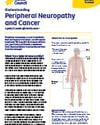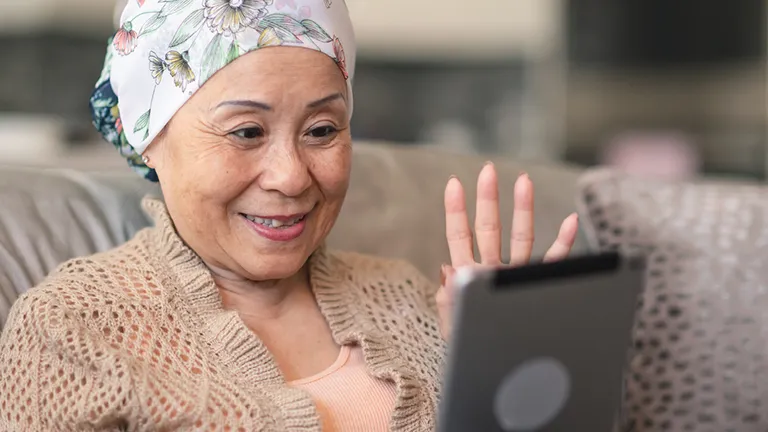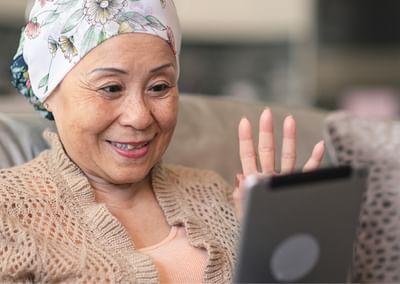Key questions
Answers to some key questions about peripheral neuropathy are below.
What is the nervous system?
The nervous system controls everything your body does. It has 2 main parts.
- The central nervous system – the brain and spinal cord.
- The peripheral nervous system – a network of nerves that carry messages between the brain, spinal cord and the rest of the body.
How nerves work
Nerves are made up of nerve cells called neurons. When a nerve ending in the body (for example, in the finger) is stimulated, a tiny electrical signal is sent through the neuron and nerve system to the spinal cord and brain. If a peripheral nerve is damaged, the electrical signals may be changed, blocked or mixed up, leading to a wide range of symptoms.
What is peripheral neuropathy?
Peripheral neuropathy is damage to the peripheral nerves. These nerves carry information between the central nervous system (brain and spinal cord) and the rest of the body. Unlike many other cells in the body, nerve cells aren’t easily repaired or replaced once they are badly damaged.
Cancer, or some cancer treatments, can cause peripheral neuropathy. It can also happen due to an accident or injury, infection or diabetes. The symptoms can vary, and depend on which type of peripheral nerves are affected.
Peripheral neuropathy most often affects the hands or feet with feelings of numbness, pain or burning, a loss of sensation, tingling or “pins and needles”. If the condition worsens, these symptoms may start to spread further up the arms and legs. Other symptoms may include muscle weakness, cramping, dizziness, balance issues, trouble sensing where your feet or hands are, ringing in the ears (tinnitus), hearing loss or constipation.
Symptoms range from mild to severe, appear during or after treatment and can be temporary or permanent (or last for months or years). The symptoms may be worse at night and disrupt sleep, and can greatly affect quality of life – but there are often ways to help manage changes.
What causes peripheral neuropathy?
There are many causes of peripheral neuropathy. Some types of chemotherapy used to treat cancer may damage peripheral nerves. This side effect is called chemotherapy-induced peripheral neuropathy (CIPN). Sometimes, other treatments such as immunotherapy, or the cancer itself, are the cause.
Possible cancer-related causes of peripheral neuropathy include:
- certain chemotherapy drugs, in particular taxanes (e.g. docetaxel, paclitaxel), platinum drugs (e.g. carboplatin, cisplatin, oxaliplatin) and vinca alkaloids (e.g. vincristine)
- the use of immunotherapy drugs
- some other cancer drugs, such as thalidomide, bortezomib and brentuximab vedotin
- some types of cancer (e.g. lung cancer, myeloma and lymphoma)
- tumours pressing on nerves
- surgery or radiation therapy damaging nerves.
Diabetes, shingles, heavy use of alcohol and some drugs, and a lack of certain vitamins and minerals (especially vitamin D and some B vitamins) can also cause, or contribute to, your risk of peripheral neuropathy. Smoking may also increase your risk.
Will I get it if I have chemotherapy?
About 40% of people who have chemotherapy will have symptoms of peripheral neuropathy. But the risk varies with different chemotherapy drugs. In people treated with certain chemotherapy drugs, the rate is higher, with about 70% of these people experiencing some symptoms a month after treatment, and about 30% still having symptoms 6 months after treatment finishes.
Will it get better?
Some types of chemotherapy cause short (acute) episodes of peripheral neuropathy during, or soon after, a cancer treatment session. These episodes tend to last a few days. For other types of chemotherapy, peripheral neuropathy may be longer-lasting (chronic). It may start during treatment and the risk increases the more treatment cycles that you have. In some cases, peripheral neuropathy can develop or get worse over time, even after treatment has finished.
When cancer treatment ends, the peripheral neuropathy symptoms may begin to improve over 6–12 months. In some people, symptoms are permanent and may be mild to severe. This is more likely if you have had intensive treatment, such as a high-dose chemotherapy, or if you have diabetes or other risk factors for peripheral neuropathy.
Driving safely
Ask your doctor if it’s safe to drive or operate machinery, especially if you do this for work. Depending on the symptoms, you may need a break from driving and your licence may be impacted.
Can it be prevented?
So far, no therapy has been proven to prevent peripheral neuropathy, although studies suggest that exercise may help. Researchers are studying whether ice mitts and booties (gloves and socks) worn during chemotherapy could help, but there is not enough evidence yet to tell if this works.
It may help to be checked for any existing nerve damage before starting treatment, so that any changes can be checked against this baseline.
If you start having symptoms during chemotherapy treatment, your doctor may reduce the doses of chemotherapy drugs, or increase the time between treatment cycles. This sometimes allows the nerves to recover and prevents permanent damage. Some people may need to stop having a particular chemotherapy drug. You can talk to your doctor about how they will balance the risk of changing the chemotherapy plan against the risk of the nerve damage becoming permanent.
If you have diabetes, it should be managed well and blood sugar levels monitored carefully, to lower your risk of peripheral neuropathy. Limiting the amount of alcohol you drink, staying a healthy weight and not smoking may also lower your risk. Talk to your treatment team about your individual risk factors, including medicines that may increase your risk.
What are the symptoms of peripheral neuropathy?
Peripheral neuropathy is a complex condition that can cause many different symptoms. This is because the damage can happen to any part of the peripheral nervous system, which includes sensory nerves, motor nerves and the autonomic nervous system. Often, more than one type of nerve is affected. Symptoms may be mild in the beginning, but often get worse over time, or with more cancer treatment.
Sensory nerves
What these nerves do – control sensation and feeling including pain, temperature, touch, vibration, and where the body is moving (important for balance and coordination)
Symptoms of damage
- numbness – not being able to feel hands or feet
- tingling or “pins and needles” in hands or feet
- pain in hands or feet – this may be burning or shooting pain, “like walking on hot sand”
- hypersensitivity – where light touch feels more intense or is painful (especially at night)
- a reduced feeling of sensation or dulled feeling of touch
- confusion about temperature (e.g. feeling heat as cold, or not being able to tell if something is hot or cold)
- loss of awareness of where your body is in space, making you feel clumsy, especially when walking on uneven surfaces
- trouble keeping your balance when walking
- loss of hearing, or ringing in the ears (tinnitus)
Motor nerves
What these nerves do – control muscle movement
Symptoms of damage
- finding it hard to do up buttons or pick up small objects
- trouble walking up stairs or getting up out of a chair
- muscle wasting or loss of muscle tone
- weakness (e.g. not being able to open a jar)
- cramps
- muscles twitching under skin
- poor handwriting
- unsteady way of walking (gait)
Autonomic nervous system
What these nerves do – control blood pressure, heart rate, temperature and sweating, digestion, and bowel and bladder function
Symptoms of damage
- constipation
- feeling bloated, or feeling full earlier than usual when eating
- diarrhoea
- dizziness when changing position from lying down to sitting up, or from sitting to standing
- changes to your vision, such as blurred vision
- trouble getting or keeping an erection
"My symptoms included acute pain, numbness, and sharp pins and needles in my hands and feet. Exercise and daily tasks became more difficult. I often felt unstable when walking and was prone to falls. I started slowly building up my fitness. I gradually got back to my tennis and long walks. It was very frustrating, but I was encouraged by small, incremental improvements.” Phil
How is peripheral neuropathy treated?
Currently there is no treatment that can reverse nerve damage.
To stop chemotherapy-induced peripheral neuropathy from getting worse, your doctor may change how much or how often you have chemotherapy. In severe cases, chemotherapy may need to be stopped altogether. If peripheral neuropathy is caused by the cancer itself, symptoms may ease once the cancer has been treated. For some people, the damage may be permanent.
You may be worried about telling your treatment team that you have symptoms of peripheral neuropathy because you want to complete the cancer treatment. But not telling them could mean that you miss any chance to reverse the nerve damage and symptoms. If your doctor recommends pausing or stopping chemotherapy, they will talk to you about other ways to treat the cancer.
Medicines to manage symptoms
Doctors use various medicines to help relieve symptoms including:
- pain medicines – you can try over-the-counter pain medicines (e.g. paracetamol, ibuprofen) but these may not be helpful; your doctor may prescribe stronger pain medicines (e.g. tramadol), but the side effects may mean that these are not good long-term solutions
- duloxetine – sometimes this antidepressant is recommended for managing peripheral neuropathy; while some studies have shown that it helps relieve numbness, tingling and pain, other studies have found no benefit
- other drugs – because treatment options are limited, some other types of antidepressants, the anticonvulsant pregabalin, and the topical creams capsaicin or lignocaine are sometimes recommended by doctors to relieve symptoms such as pain, but how well they work is not clear
- laxatives or stool softeners – these can help manage constipation.
- See our Understanding Cancer Pain booklet.
You may see a range of health professionals to help manage peripheral neuropathy symptoms, including a psychologist (or sometimes a pain specialist), exercise physiologist, occupational therapist, physiotherapist or podiatrist.
Ways to manage peripheral neuropathy
Try these tips to help relieve symptoms, reduce the risk of injury and adapt to life with peripheral neuropathy.
Exercising
Studies suggest that in people having chemotherapy, those who do some exercise have a lower risk of developing nerve damage. Gentle, regular exercise can also help reduce the symptoms of peripheral neuropathy pain. A daily gentle walk is a good starting point. Continuing to exercise after you finish treatment may also lower your risk of post-treatment peripheral neuropathy. A physiotherapist, exercise physiologist or occupational therapist can create a suitable exercise plan that’s personalised for your situation.
Download our booklet ‘Exercise for People Living with Cancer’
Avoiding falls
- Avoid slippers or shoes with thick soles that might make you trip.
- Keep rooms well lit.
- Remove clutter and any loose rugs.
- Use a non-slip mat in the shower and bath.
- Place rails on stairs and in the bathroom.
- Talk to your doctor about a falls prevention program.
An occupational therapist suggests aids or equipment (e.g. special shoes) or strategies (e.g. using visual cues on uneven ground) to help you with daily tasks and to reduce your risk of falls. They may gradually introduce different textures to encourage normal use of your hands. A physiotherapist or exercise physiologist may help you to improve your strength and balance, and may also suggest walking aids.
Caring for hands and feet
- Moisturise and keep nails trimmed.
- Keep hands and feet warm.
- Wear gloves when washing the dishes or gardening.
- Use heatproof potholders when cooking.
- Test water temperature with your elbow.
- Make sure your shoes fit well.
- Untuck sheets and bedcovers. Try silk or bamboo sheets if your feet are sensitive or use a special frame to keep sheets off your feet.
- Some people find magnesium (in a cream or tablet) eases muscle cramps in the feet and legs.
A podiatrist can trim your toenails, treat any skin problems (e.g. blisters and corns), and check your feet for signs of any injuries that you may not have noticed.
Preventing dizziness
- Drink plenty of fluids.
- Go slowly when you stand up to allow your blood pressure to adjust. Stay by the chair or bed for 20 seconds after standing up.
- Wear support stockings during the day to improve your circulation.
- Sit down when brushing teeth or putting on shoes.
- When getting out of bed, sit up and gently move your feet and legs for a little while, before standing up.
Coping with pain and other challenges
Learning relaxation or meditation may help you manage pain and discomfort. A psychologist can teach you these techniques, or try our Finding Calm During Cancer podcast. Some people find massage helps nerve pain, but check with your doctor first. TENS (transcutaneous electrical nerve stimulation) devices which send small electrical currents to parts of the body, and certain dietary supplements, are in clinical trials to see if they help. A counsellor or psychologist can help with the challenges caused by your diagnosis.
Managing constipation
- Eat plenty of fruit, vegetables, whole grains and high-fibre foods.
- Drink plenty of fluids.
- Do some physical activity (such as walking) daily, as this often helps.
- Talk to you doctor and take any laxatives as prescribed.
Talking about your sex life
Talk to your doctor about issues with erections, vaginal dryness or loss of libido as there may be medicines that can help.
The impact of peripheral neuropathy
This varies from person to person, but can include:
- discomfort and pain from physical symptoms
- trouble completing usual tasks (e.g. doing up buttons)
- high risk of burns and cuts due to numbness, which can increase the risk of infection during chemotherapy
- risk of not noticing injuries, which may become more serious because they aren’t treated promptly
- high risk of falls and difficulty walking due to numbness or pain in your feet or feeling off-balance
- constipation and lack of bowel or bladder control
- poor sleep because of shooting pains
- not being able to drive because of symptoms
- feeling isolated or that you have lost your independence
- not being able to return to work or usual activities
- money issues because of health care costs.
Call Cancer Council 13 11 20 for help with these impacts.
Featured resource
This information was last reviewed December 2024 by the following panel: Dr Fiona Day, Senior Staff Specialist Medical Oncologist, Calvary Mater Newcastle, NSW; James Chirgwin, Senior Physiotherapist – Oncology, Haematology and Palliative Care, The Wesley Hospital, QLD; Kim Kerin-Ayres, Nurse Practitioner Cancer Survivorship, Sydney Cancer Survivorship Centre, Concord Hospital, NSW; Melanie Moore, Lead Exercise Physiology Clinical Supervisor, UC Cancer Wellness Clinic, University of Canberra, ACT; Olivia Palac, Acting Assistant Director, Occupational Therapy, Gold Coast University Hospital, QLD; Danielle Rippin, Consumer; Dr Jane Wheatley, Clinical and Health Psychologist, Department of Pain Medicine, St Vincent’s Health Network, Sydney, NSW.







